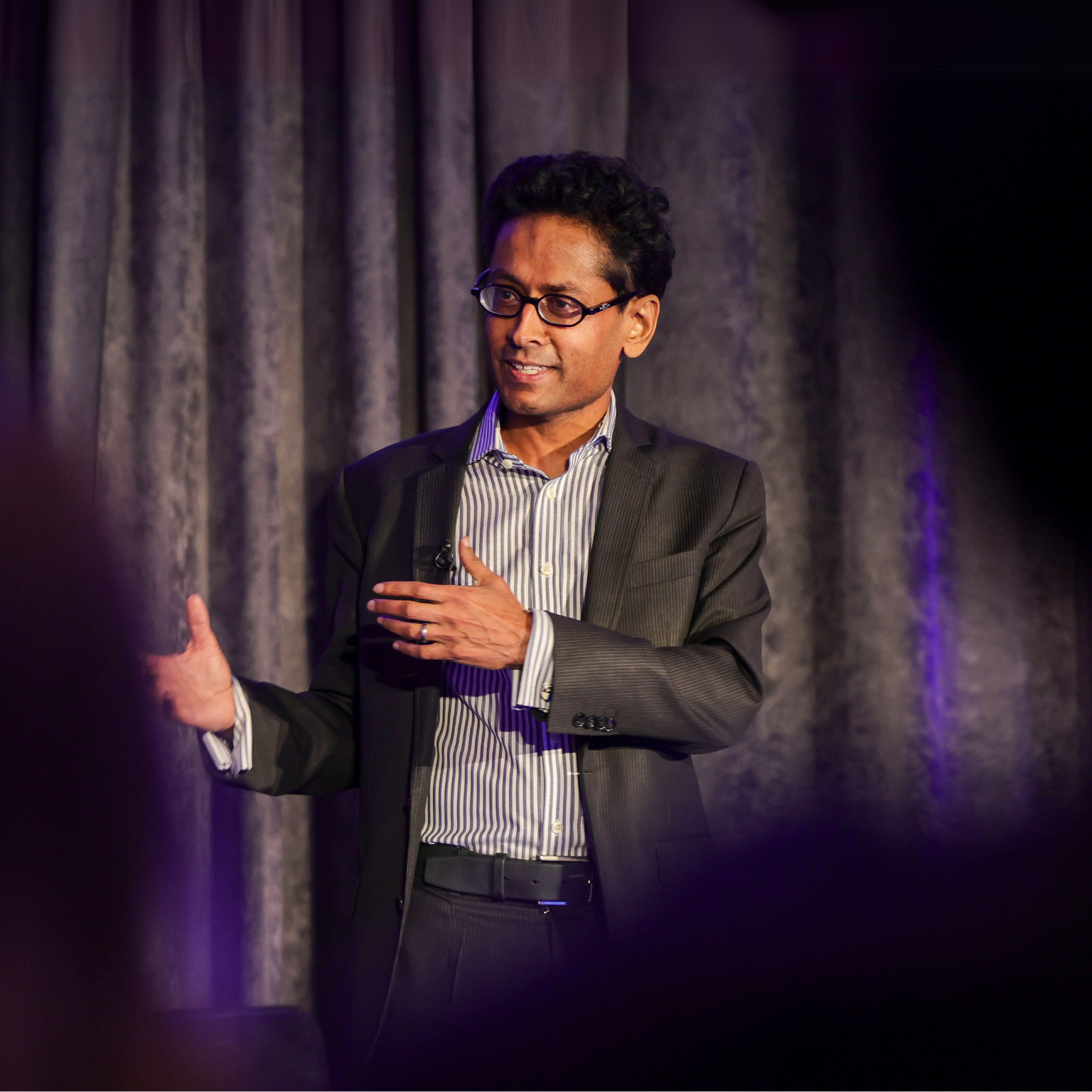Steps to counter the new grimness of global public health
Global health initiatives are facing real challenges, but collaboration, co-creation and clear communication offer ways through, according to Dr Kumanan Rasanathan from the Alliance for Health Policy and Systems Research at the World Health Organization. By Dr Claire O’Connell.
5 min read - 25 Mar 2025

Grim. It’s an apt word to describe global health, which is beset by challenges of public trust, vital resources, inequity and the impacts of the climate emergency.
“In my world of global health, it may seem like things are falling apart,” said Dr Rasanathan in his keynote address last month to the HRB Grant Holders Conference in Athlone.
As Executive Director of the Alliance for Health Policy and Systems Research at the WHO, Dr Rasanathan has a close-up view of the challenges that countries around the world face, and the picture is changing – especially for developing countries.
“Earlier this month in Geneva, we just concluded the executive board of the World Health Organization, and my discussions with country delegations were very grim,” he said.
“For example, my South African friend said to me that they are now trying to work out how to fill a US$400-million gap in the health system that funds their HIV program [and] employs thousands of workers, mostly women, mostly at community level. And they really have no easy solution for that. And if they don’t find a solution or if things don’t change, a lot of people are going to die.”
But Dr Rasanathan believes that researchers in science and health can help to counter the hurdles that global health initiatives are facing, by putting the focus on innovation, delivery of discoveries, efficiency and equity.
“[This is the] only way that our health systems are going to be able to cope with all of these challenges and to address this crisis and confidence in scientific expertise and experts,” he said.
Achievements under threat
The last 25 years have seen enormous strides in global public health, with rapid increases in life expectancies and reductions in child mortality, noted Dr Rasanathan, who pointed to the Millennium Development Goals as a key foundation for this progress.
“In 2000, about 10 million children died every year under the age of five from preventable causes. And now it’s under five million children. Still far too many, but that is dramatic progress,” he said.
“We still have a long way to go, but a lot less people die, there are a lot less infections, and that’s why it’s so grim that progress is in peril today and that we would catastrophically go back.”
Downtrend in trust and investment
One of the key enablers of progress in global health has been trust in scientists and health experts, but this is being eroded, warned Dr Rasanathan, whose started his public health career developing vaccines against bacteria that cause meningitis.
“There’s a huge challenge of anti-vax in all countries. a real fragmentation and deterioration of people’s trust in health systems, of people’s trust in science, people’s trust in all of us,” he said. “I think that’s something we need to take very seriously.”
Add to this, the falling budgets for domestic and global health programmes, the growing societal impacts of climate change and rapidly ageing populations in many parts of the world and the picture becomes even grimmer, noted Dr Rasanathan.
He is particularly concerned about the impact on low-resource and marginalised groups and countries, and he stressed that the lack of equity in global health is everyone’s issue.
“Global money is very important politically, it’s often very important for the most marginalised groups and countries,” he said. “We are struggling to pay people in Uganda to combat Ebola. What lessons have we learned over the last 10 years in terms of emerging threats?”
Optimism in the face of challenge
Despite the unnervingly shifting backdrop of global health, Dr Rasanathan is optimistic about the power of researchers to innovate, to improve efficiency and to realise equity.
But to do this, researchers need to work together in new ways, he stressed.
“We’ve often fragmented ourselves into basic researchers and clinical researchers, and those of us who do policy research or implementation research. But for people to deliver at scale, to integrate equity, we need all of them together. And that doesn’t mean we all need to do everything. We need specialisation, we need the ability to be good at what we do. But we do need to be able to come together and understand how we contribute.”
Creating such coalitions will need more systemic incentives, and we also need clearer communication between and beyond researchers, noted Dr Rasanathan.
“We’re not so good at co-creating as we could be. We talk about it, but researchers still remain off in silos from policymakers, from implementers, from decision makers, from communities, from clinicians. We could do a lot better.”
Technologies, including AI, could help to improve efficiencies, he noted, and good governance will be essential.
Deliver fairly on the ‘golden era’ of discovery
Dr Rasanathan also stressed the need to focus on how to deliver on the ‘golden era’ of discovery science, with exciting new developments in health, such as messenger RNA vaccines and treatment advances for conditions such as cancer, diabetes and eczema.
“When will most of the world get access to all these new therapies, which are transformational?” he asked.
“We have much less developed our science of delivery, of how we can actually ensure that people benefit from that science.”
Increase the reach of research
He remains optimistic that the current turmoil in global health can yield equitable opportunities, but he puts the emphasis on collaboration: “That opportunity will only occur through a lot of hard work, through people coming together and through us as scientists challenging ourselves to broaden who we try to reach, and through not compromising on the quality of our science. Because without first-class science, none of the other stuff will make a difference.”
5 min read - 25 Mar 2025



